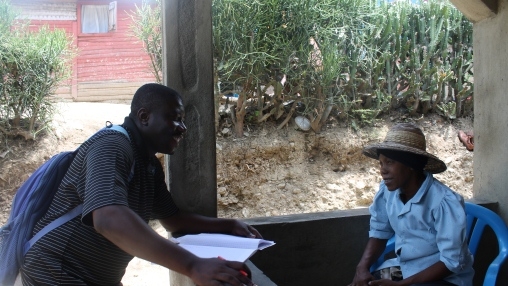Exhausted, but with a smile on her face and surrounded by her children, Ms. Christophe looks at her two-week old baby girl as she breastfeeds her, while talking with Collin, a community social worker who visits her on a regular basis.
He inquires about the baby’s health, and insists that she get a post-natal check-up as she did not give birth in a hospital. He ensures that she remembers how to treat the water before asking her about the benefits of breast milk.
Ms. Christophe immediately responds: “Breast milk provides nourishment for the baby and this is what the baby needs to grow.” Collin agrees wholeheartedly and begins to explain to her the best position to breastfeed, amid fits of giggles.
Collin is one of the community social workers who are providing assistance to some 15,000 families in three communes (Boucan Carré, Saut d’Eau, and Thomassique) in the Centre department.
Improving access to basic services
The Community Social Worker Initiative (KORE FANMI) is a pilot program of the Haitian Government, which is being implemented by the Economic and Social Assistance Fund (FAES).
It was established with World Bank financing in partnership with a number of United Nations agencies such as UNICEF.
As part of a national social protection strategy, this program seeks to harmonize and improve the provision of basic services to poor and vulnerable families, such as access to education, vaccines, and latrines, with a view to moving away from a national fragmented and unequal system to one of systematic coverage focusing on the rights and needs of families, as indicated on the program’s website.

